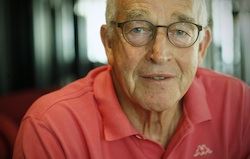

Breaking boundaries and building bridges
 Breaking boundaries and building bridges
Breaking boundaries and building bridges
The handball destiny of the former player, national coach of Netherlands and official was been sealed very early in his life - the same year Jan Tuik was born his father established a handball club in his home town, Delfzijl.
In the eighties he actively participated in the process which saw the creation of the new continental body, the European Handball Federation, and last year marked the 20th anniversary of the work of the economist.
Before the start of his final EHF Congress in Monaco, Jan Tuik talked to eurohandball.com.
What do you see as the greatest moment in your EHF career?
I have experienced so many highlights and it´s really difficult to pick just one out.
In the Commission we faced many problems and had to sort them out. I worked together with many great teams of organisers from Sweden, Denmark and Serbia, but I would say that one of the best organised EHF EURO tournament took place in Austria in 2010.
The co-operation was excellent and despite the fact that even there I saw some space for improvement it was a great example of how a small country can host a big event in a perfect way.
It was a huge compliment for us when the national coach of France Claude Onesta said before EHF EURO 2012 that to win the European championships is the biggest challenge for him since this tournament is the most difficult and the best organised.
How do you see the development of EHF EURO from its beginnings?
One year before the first edition in Portugal in 1994 we stood on the beach and we were promised there will be a players´ hotel. And it really happened.
We started with a small and nice competition and since then we have enlarged the number of the participants, increased TV hours and spectators interest.
The huge progress is clearly visible in the bidding documents for the candidates. We are on a high level and we can proud on what we have achieved.
And what about the club competitions? Are you satisfied with their growth?
We have seen a really huge development in recent years. The VELUX EHF FINAL4 tournament from the very start has attracted a lot of attention and even people from FIBA Europe were praising our job.
In the EHF Champions League, the newly created EHF Cup and the Challenge Cup we have three pillars and we think this model is very suitable for European handball.
It´s more difficult to do the same with women´s competitions, but the lines are put down and the process should go on.
But I would also like to point at some other successes of the Commission. For example officiating - we managed to change the education and preparation of referees, and we introduced a completely new system for delegates.
In the past they were in the match to sit behind the timekeeper´s table and count mistakes of referees, but the new model should support and help referees more.
The delegates should stay critical, but positive as well and they should provide referees with tools to improve.
We have also implemented e-learning, and testing. But there is always a lot of things to improve and you can´t reaching the finish line, because the journey itself is more satisfying than the finish.
Where do you see the space for improvements?
Obviously, we have to pay more efforts in women´s handball. I know it will be more difficult to find sponsors and attract an interest, but we can take Norway or Denmark as positive examples.
What are your emotions at your last congress?
I have to admit my emotions are mixed. On one hand for several years I have been expecting this moment when I have to stop my work, on the other hand I see this age-limit rule as one of our own mistakes. I was there when we created this rule to give some space to younger people, but as I said my feelings are mixed now.
Anyway, I am ready to support my younger colleagues and I hope they will carry on with our work. I also want to thank all my former colleagues, but I would like to mention three people separately - Helmut Höritsch, Markus Glaser and Monika Flixeder.
What´s your legacy?
Breaking down boundaries and building bridges between federations and clubs. This game is too nice to make mistakes and not to try it.





